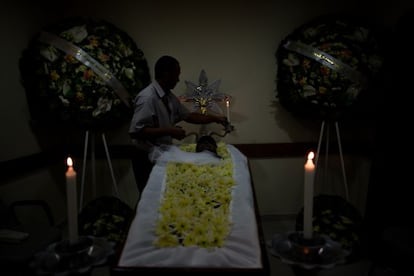The hearse drivers of São Paulo, who prepare bodies for “love of the work”
Grieving loved ones often receive undressed corpses from city forensic officials Around 140 drivers go beyond official duties, and help families prepare the deceased for burial

The body of “Daniel”* was already in rigor mortis, and neither his sister, the private mortician hired by the family, or José, the driver of the city’s funeral hearse, could manage to dress him. Nor were there any officials at São Paulo’s Legal Medicine Institute (IML), which conducted the autopsy on Daniel, on hand to offer some help.
But one person, a cleaning lady with long yellow gloves, stepped in to aid the grieving family. Using a broom as a lever, the woman managed to lift his legs up from the coffin.
Using a broom as a lever, the cleaning lady managed to lift the legs of the body up from the coffin
Blood covered Daniel’s face and body, as well as the coffin itself – a stitch from the autopsy had come loose. Crying for the man, who had died from a drug overdose, the sister lamented that she forgot to stop by the pharmacy to purchase gauze.
The body was taken to a nearby cemetery for burial.
The driver, José, is only paid by the city to put bodies in coffins and then cover them with flowers. But during the wake for Daniel he also helped clean up the blood, so that the young man’s family would be able to see him for the last time in a presentable state.
The burying business
By law, funeral services in São Paulo are paid for and organized by the city, and private mortuary practice is illegal.
To apply for a funeral, the family must have an official death certificate issued by the hospital, IML or the unit in charge of verifying and recording deaths.
With this document, the city can begin preparing for a wake and burial. Families are allowed to contract places where the viewing will be held, as well as embalming services and private transport if the body is to be buried in another city.
In practice, the city has a monopoly on services it considers essential and only charges 701 reals (less than $200) to cover costs.
Like José, there are about 140 funeral hearse drivers in São Paulo who go beyond their official duties and help families prepare the deceased for burial when no one else will. It is estimated that around 79,000 bodies are attended to this way each year in the Brazilian city.
Just two days before Daniel’s death, a 67-year-old man died from kidney failure at a hospital in Ipiranga. The man, who also suffered from Alzheimer’s disease, was placed on a metal shelf in the hospital’s basement, wearing just a diaper.
His family had asked the staff if someone could dress him in a São Paulo Soccer Club t-shirt and a pair of pants they had brought in a plastic bag. The only person who volunteered was the hearse driver.
These drivers usually step in to fulfill the last wishes of grieving loved ones, including dressing the bodies, because – as they say – it is a matter of human rights.
Hospital and other officials sometimes agree to “tidy up” the bodies, but for tips, which can sometimes double their salaries.
The problem of who should prepare bodies before they are turned over to the families stems from the fact that no one is in agreement.
The unit in charge of verifying and recording deaths, which is associated with São Paulo University, turns over the bodies already dressed. However, in state and municipal hospitals, the practice varies and sometimes families receive bodies without a stitch of clothing on.
The drivers usually step in to fulfill the last wishes of grieving loved ones, saying it is a matter of human rights
This also happens at the IML, which performs forensic studies on victims of violent deaths and those who have died from unknown circumstances.
The rules at the institute, which reports to the secretary’s office for Public Security, state that bodies must be cleaned and dressed before they are released to the families. But if it wasn’t for workers like the hearse drivers, the deceased wouldn’t even be covered with a shroud.
Hearse driver Carlos complains about the IML but says he dresses the deceased “out of respect for their families.” Carlos has grown accustomed to being around dead bodies: he used to accompany his father, who held the same job.
He explains that a lot of the things he does are for his “love of the profession,” although it’s hard to imagine that could be true after watching him, without help from anyone, maneuver a body that looks like it has been run over by a bus into a coffin. That night he began to feel nauseous, and revealed that he does have some limits: the necktie that the family had brought for the funeral stayed in its bag, while the shirt they had provided was used to quickly cover up the butchered corpse. The lid of the coffin, meanwhile, remained nailed down.
Hospital officials sometimes agree to “tidy up” the bodies, but do so in exchange for tips
“This happens almost every day. If I don’t do it, no one will. Was I supposed to call the family so that they could see this?” he asks.
Corruption on both the small and large scales is another problem facing the city’s forensic services, which historically have been under budget.
Mortuary middle-men, known as papadifuntos (literally, dead dads), sometimes take advantage of grieving families who are unaware that funeral services are provided exclusively by the city. They charge exorbitant prices by promising faster services and reduced paperwork, even though the bureaucracy, transportation and burial is still up to municipal authorities.
Sometimes corrupt public officials also conspire with these unscrupulous intermediaries and earn money through such fraud schemes.
Discussions about privatizing funeral services in the city have been going on for years.
The administration of current mayor Fernando Haddad of the Workers’ Party (PT) has proposed eventually subcontracting hearse drivers so that they can be fired if they are caught in funeral fraud schemes. Nevertheless, there isn’t much interest in turning a profit on what is considered an essential service.
*All names in this article have been changed.
English version by Martin Delfín.
Tu suscripción se está usando en otro dispositivo
¿Quieres añadir otro usuario a tu suscripción?
Si continúas leyendo en este dispositivo, no se podrá leer en el otro.
FlechaTu suscripción se está usando en otro dispositivo y solo puedes acceder a EL PAÍS desde un dispositivo a la vez.
Si quieres compartir tu cuenta, cambia tu suscripción a la modalidad Premium, así podrás añadir otro usuario. Cada uno accederá con su propia cuenta de email, lo que os permitirá personalizar vuestra experiencia en EL PAÍS.
¿Tienes una suscripción de empresa? Accede aquí para contratar más cuentas.
En el caso de no saber quién está usando tu cuenta, te recomendamos cambiar tu contraseña aquí.
Si decides continuar compartiendo tu cuenta, este mensaje se mostrará en tu dispositivo y en el de la otra persona que está usando tu cuenta de forma indefinida, afectando a tu experiencia de lectura. Puedes consultar aquí los términos y condiciones de la suscripción digital.









































